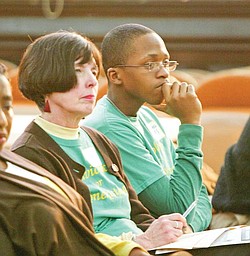MLK workshop focuses on health-care reform
KING WORKSHOP: Penny Wells, left, and Greg Jones were among those who attended a Martin Luther King Community Workshop at First Presbyterian Church, 201 Wick Ave. The event took place Monday to commemorate the Rev. Martin Luther King Jr.’s birthday.
By Sean Barron
Dr. Martin Luther King Jr. spoke against a health-care system he felt was unfair to the poor.
YOUNGSTOWN — Perhaps foremost on the minds of those who think of Dr. Martin Luther King Jr. are his famous 1963 “I Have a Dream” speech in Washington, D.C., or his calls to end discrimination and segregation.
Another issue that was often on King’s mind was affordable health care for the poor.
Health-care reform was the central topic of Monday’s 27th annual Martin Luther King Community Workshop at First Presbyterian Church, 201 Wick Ave.
The three-hour gathering, themed “Health Care as a Human Right,” featured speakers and a panel that addressed the health-care reform bill being debated, the need for universal coverage and why the issue parallels some of King’s beliefs.
Kicking off the session was U.S. Rep. Tim Ryan of Niles, D-17th, who called the current legislation “a major step forward.”
The bill won’t solve all of the system’s problems but will provide coverage to an additional 30 million Americans, allow them to go to a primary physician for immediate care and prevent insurance companies from denying coverage to those with pre-existing conditions, Ryan told the audience of about 100.
“At some point, you will get sick, and at some point, you will access the health-care system,” he said.
Under the current system, he continued, many people with minor illnesses wait to seek treatment until they’re eligible for Medicare. By then, however, their illness has progressed, increasing the need for more expensive care and costing taxpayers more, he explained, adding that a major reason for about 50 percent of personal bankruptcies is astronomical health-care costs.
Some people who don’t know where else to turn go to a hospital’s emergency room for colds and other minor illnesses — and wind up paying far more than they should, Ryan said.
“If we don’t [pass the reform bill], in 10 years one out of five dollars will be spent on health care,” he warned. “It will continue to eat up business’s budgets … and family budgets.”
More than 40 years ago, King spoke against a system he felt largely denied coverage to many older and poor people, some of whom died unnecessarily, Ryan added.
The workshop also featured a panel made up of: the Rev. Amariah McIntosh, pastor of Phillips Chapel CME Church in Youngstown; the Rev. Robert Johnson, a board member of the Midlothian Clinic; Elizabeth Bowen, regional development and field director of Planned Parenthood of Northeast Ohio; and Michael D. Robinson, Humility of Mary Health Partners’ regional director of access to care and outreach operations.
Johnson noted that typical clients of his clinic, which opened in March 2008, include women who work but can’t afford health costs. The clinic benefits many young people with Type 2 diabetes, the most serious kind, who can’t afford insurance because they often receive low-cost treatment for related illnesses, he explained.
The clinic is open three Thursdays each month for four hours, Johnson added.
In May 1966, King won Planned Parenthood’s Margaret Sanger Award for his dedication to social justice and human dignity, Bowen noted. Sanger was a nurse and PP’s founder.
“Health care is social justice and a human concern,” the Rev. Ms. McIntosh said. “It’s a God-given right to be healthy and have access to means to have it.”
It’s also imperative that those 18 and older be registered to vote so as to hold elected officials accountable regarding health care and other issues, she said, adding that it’s also people’s responsibility to eat well and exercise.
Robinson said that HMHP has started Access Health Mahoning Valley, set up to bring several entities together to help those who can’t afford health care. One such program makes sure expectant mothers have affordable immunizations and other care, he noted.
Drawing parallels between the need for grass-roots activism today and during King’s time was the Rev. Chris McKee, staff pastor of Christian Revival and Discipleship Center in Youngstown.
McKee, who’s also with the Mahoning Valley Organizing Collaborative, stressed that the organization started phone banks to push local and state legislators to vote for health-care reform.
Churches and other community organizations also must lobby and be sure people are able to vote, he added.
Moderating the workshop was the Rev. William J. Blake, director of Youngstown State University’s office of Student Diversity Programs.
 43
43

